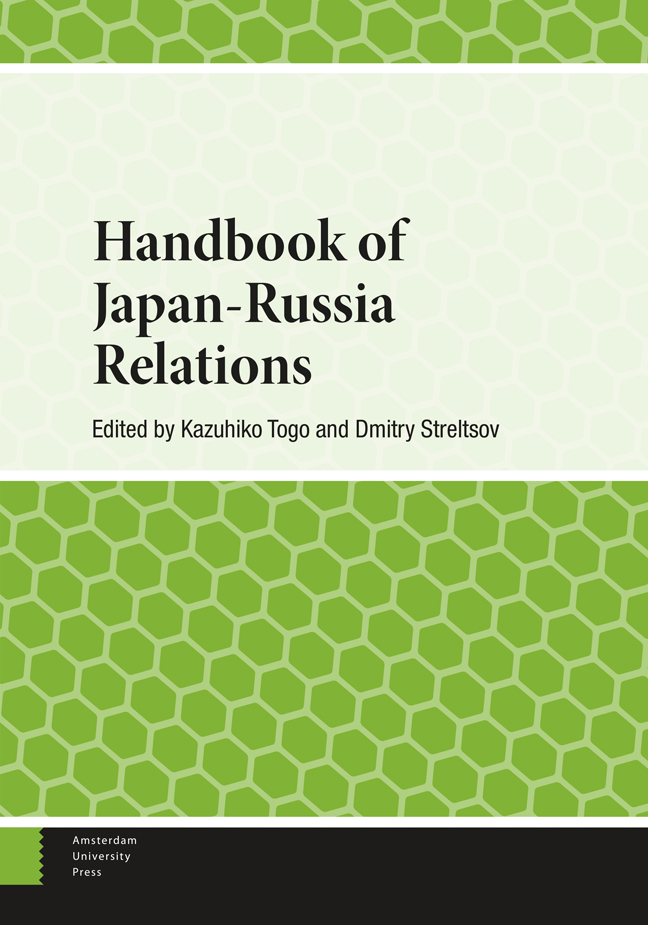Book contents
- Frontmatter
- Contents
- Dedication
- Acknowledgements
- Contributors
- Abbreviations
- Introduction
- Part 1 War and Peace: Diplomatic Relations and Security
- Part 2 Territory
- Part 3 The Economy and Energy
- Part 4 Disaster Cooperation
- Part 5 Culture
- Part 6 Perceptions of the Other
- Appendix 1 1956 Joint Declaration
- Appendix 2 Tokyo Declaration (1993)
- Appendix 3 Moscow Declaration (1998)
- Appendix 4 Irkutsk Statement (2001)
- Appendix 5 Foreign Ministry Statement (2022)
- Index
4 - Japan-Russia Relations and Security: The Japanese Perspective
Published online by Cambridge University Press: 26 March 2024
- Frontmatter
- Contents
- Dedication
- Acknowledgements
- Contributors
- Abbreviations
- Introduction
- Part 1 War and Peace: Diplomatic Relations and Security
- Part 2 Territory
- Part 3 The Economy and Energy
- Part 4 Disaster Cooperation
- Part 5 Culture
- Part 6 Perceptions of the Other
- Appendix 1 1956 Joint Declaration
- Appendix 2 Tokyo Declaration (1993)
- Appendix 3 Moscow Declaration (1998)
- Appendix 4 Irkutsk Statement (2001)
- Appendix 5 Foreign Ministry Statement (2022)
- Index
Summary
This chapter discusses the Japan-Russia relationship primarily from the security perspective. Neither Japan nor Russia have regarded the other as a serious security threat. The Japanese side has pursued relations with Russia primarily with an eye toward resolving territorial disputes and deterring China, while the Russians have seen the benefits of engaging Japan in a geopolitical confrontation with the United States. Thus, the conclusion of this chapter is that Japan-Russia relations are largely defined by relations with major powers such as China and the United States.
Introduction
This chapter examines the Japan-Russia relationship from the perspective of national security. The main arguments here are as follows: First, Russia today is not an imminent military threat to Japan. Russia does not have the motivation, will or capability to directly invade Japan. In addition to this, unconventional methods of intervention, such as the information warfare used in the United States, Ukraine, and other post-Soviet republics are not likely to work against Japan.
Second, Russia is nevertheless a state of security significance for Japan. Here, the China factor has played an important role. For Japan, which is concerned about China’s political, economic, and military rise, it has been seen as a “nightmare” that China and Russia would further strengthen their relationship and become a military alliance. For this reason, Japan’s diplomacy with Russia has often been discussed positively from the perspective of maintaining the balance of power with China.
Third, however, the Abe administration’s Russia policy failed to achieve its objectives. The more Japan pursued closer ties with Russia, the more Russia’s attitude hardened, eventually escalating to a demand for the withdrawal of US forces from Japan. For Russia, which has been at odds with the US since 2014, it is likely that Japan was viewed as a weak point in the US-centered international order rather than a negotiating partner. Put another way, just as Japan’s diplomacy with Russia was heavily influenced by the China factor, Russia’s diplomacy with Japan was driven by the US factor.
Therefore, the conclusion of this chapter is that although Japan and Russia do not directly regard each other as a threat, they do have a strong security dimension in their respective relations with the Great Powers, United States and China.
- Type
- Chapter
- Information
- Handbook of Japan-Russia Relations , pp. 56 - 72Publisher: Amsterdam University PressPrint publication year: 2024

